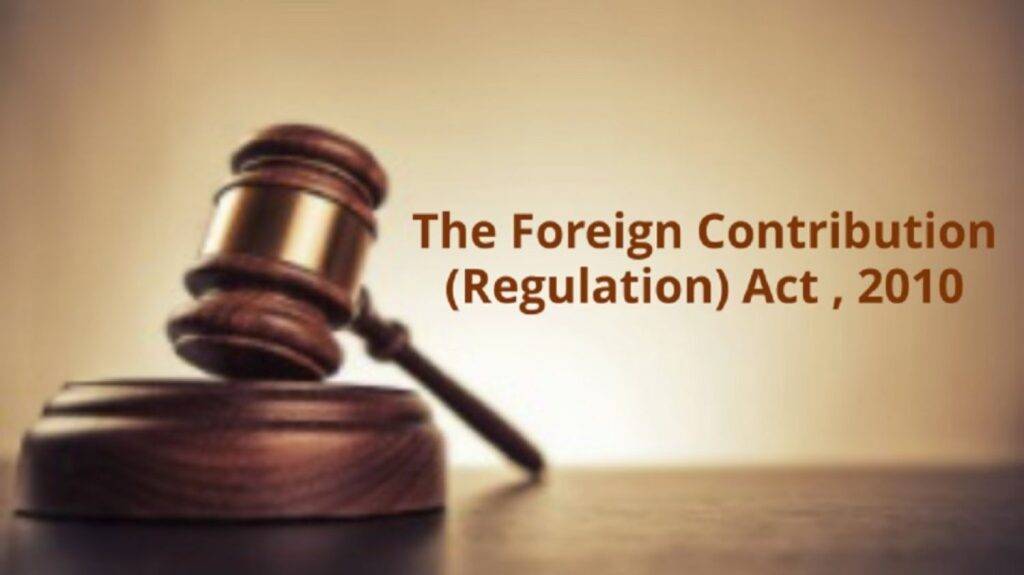Foreign Contribution (Regulation) Act (FCRA), 2010 (GS Paper 2, Governance)

Recent Developments
- The Indian government recently issued a notice emphasizing that NGOs involved in anti-development activities or forced religious conversions will face cancellation of their Foreign Contribution (Regulation) Act (FCRA) registration.
- The notice specifies stringent actions against NGOs that misuse foreign donations or engage in activities that harm social harmony, national security, or public order.
Key Observations in the New Notice:
- Foreign Contributions and Social Harmony: NGOs whose acceptance of foreign funds is seen as detrimental to social or religious harmony will face cancellation of FCRA registration.
- Anti-National Activities: NGOs involved in anti-development or anti-national activities, or those inciting malicious protests, or linked to terrorist/anti-radical organizations, will also have their registrations revoked.
- Forced Religious Conversion: NGOs found to be using foreign funds for forceful religious conversions will face cancellation of their FCRA status.
- Failure to Utilize Funds Appropriately: NGOs not utilizing foreign contributions for their stated objectives and projects will also face deregistration under FCRA.
About the Foreign Contribution (Regulation) Act (FCRA), 2010:
- The FCRA was enacted to regulate and oversee foreign donations to NGOs, with a primary focus on safeguarding India's internal security.
- It was introduced during the 1976 Emergency as a measure to curb foreign interference and control funding that could adversely impact the nation’s sovereignty.
Key Features of FCRA:
- Scope: It applies to all NGOs, groups, and associations that intend to receive foreign donations. Any NGO that accepts foreign funding must be registered under FCRA.
- Purpose: The act is designed to ensure that foreign donations do not influence the political or social landscape in a way that could undermine India’s sovereignty, democracy, and security.
- Transparency and Accountability: The Act mandates transparency in the utilization of foreign funds and aims to prevent misuse, ensuring that contributions are used in alignment with the stated objectives of the organization.
FCRA (Amendment) Rules, 2020:
Several significant amendments were introduced under the FCRA (Amendment) Rules in 2020:
- Public Servants Prohibited: Public servants are prohibited from accepting foreign contributions, ensuring that government officials are not influenced by external funding.
- Identification Requirements: NGOs must provide Aadhaar numbers for all key functionaries (directors, office bearers, etc.). Foreign applicants must provide copies of passports or Overseas Citizen Cards for identification.
- Restriction on Fund Transfers: The transfer of foreign contributions to other individuals or NGOs is banned unless the recipient is also registered to accept foreign contributions.
- Administrative Expense Limits: Only 20% of foreign donations can be used for administrative expenses, down from the previous 50% limit.
- Designated FCRA Account: All foreign donations must be deposited in a designated FCRA account in a specific branch of the State Bank of India, New Delhi.
Suspension and Cancellation of FCRA Registration:
- The government holds the authority to suspend or cancel an NGO’s FCRA registration for non-compliance, especially when it is deemed necessary for public interest.
- If deregistered, an NGO is ineligible for re-registration for three years.
Concerns Associated with the FCRA:
While the FCRA aims to regulate foreign funding and ensure that donations are used for legitimate and transparent purposes, there are several concerns regarding its impact on civil society:
- Impact on Dissent and Advocacy: NGOs working on issues such as human rights, environmental protection, and civil liberties may find themselves subject to scrutiny and potential action under FCRA, especially when their activities challenge government policies or involve sensitive topics.
- Chilling Effect: The threat of FCRA suspension creates a chilling effect on many NGOs, leading to self-censorship. Organizations may refrain from addressing critical social issues to avoid government scrutiny or suspension of their funding.
- Human Rights and Environmental Advocacy: FCRA regulations have been seen as particularly restrictive for NGOs involved in human rights or environmental advocacy. This has raised concerns that the government might be targeting NGOs that engage in activities that challenge or criticize state policies, thus stifling independent voices.
- Global Image of India: The stringent implementation of FCRA has raised concerns internationally about the state of democracy and freedom of speech in India, affecting the country’s image in global indices of freedom and democracy.
Way Forward:
To address these concerns and improve the regulatory framework for NGOs, some potential reforms have been suggested:
- Separate Law for Voluntary Agencies: The Vijay Kumar Committee has suggested creating a separate law for NGOs engaged in charitable and public welfare activities. This would provide a more effective and efficient regulation of the sector while recognizing the valuable contributions of NGOs to society.
- NGO Database: Establishing a searchable database of registered NGOs, as recommended by the Vijay Kumar Committee, would provide better transparency and accessibility of information about NGOs and their activities.
- Grace Periods for Compliance: Instead of immediately canceling an NGO’s registration for non-compliance, a grace period could be provided for NGOs to submit necessary documents and rectify deficiencies.
- Establishment of NGO Coordination Centers: To foster better collaboration and communication between NGOs and the government, coordination centers could be set up to streamline processes and ensure more effective regulation without stifling the activities of civil society.
Conclusion:
- The FCRA is an important law that ensures transparency in foreign funding and safeguards India’s internal security.
- However, the concerns surrounding its implementation—particularly the potential for curtailing free expression and civil society activities—highlight the need for a more balanced approach.
- By improving regulatory processes and providing NGOs with clearer guidelines and grace periods for compliance, the government can support the work of NGOs while maintaining security and transparency.

